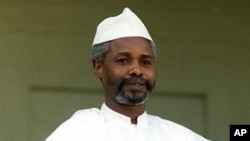A coalition of human rights organizations is calling on the Senegal to stop delaying the extradition of former Chadian dictator Hissène Habré to Belgium.
Tuesday, January 10, the Court of Appeals of Dakar ruled a Belgian extradition request was inadmissible because legal papers submitted by the Senegalese government were not in order, the second such decision in six months.
Habré is accused of thousands of political killings and systematic torture when he ruled Chad from 1982 to 1990 before fleeing to Senegal.
Clement Abaifouta, president of the Association of Victims of Crimes of the Regime of Hissene Habre, said he is disappointed in the Senegalese court’s decision not to extradite the former Chadian leader.
”I think it is a big decision for all the victims like me to know that Senegal refused again to extradite Hissene Habre to Belgium. I don’t know why [Senegalese President] Abdoulaye Wade is playing this game by refusing to extradite Habre,” he said.
Abaifouta said the Dakar Court of Appeals would not have ruled the way it did without President Wade’s approval.
“Since 12 years ago, we have been dealing with this case. I know that it is the president who does not want for this extradition to happen because, as you know in Africa, the head of state always makes all the decisions,” Abaifouta said.
U.S. Secretary of State Hillary Clinton is expected to report to Congress by February 6th on “steps” the Senegalese government has taken to assist in bringing Habre to justice.
According to the International Committee for the Fair Trial of Hissene Habre, the U.S. Congress last December expressed concern that the former Chadian leader has not been extradited for prosecution.
Abaifouta said he hopes Congress will tell President Wade to respect his international obligation to extradite Habre.
“I know that, according to the law, Senegal has the right to judge or to extradite [Habre],” he said.
Abaifouta said he spent four years in Habre’s jails for unspecified charges, and during that time he was forced to dig graves for more than 500 fellow inmates.
“They arrested me in July 1985, and I was freed in 1990 February. I was in prison for four years. I’m waiting to ask Hissene Habre for what reason he arrested me,” Abaifouta said.
Habré was first indicted in Senegal in 2000, but after political interference by the Senegalese government that was denounced by two UN human rights rapporteurs, the country’s courts said that he could not be tried there.
His victims then filed a case in Belgium. After years of investigation, in September 2005, a Belgian judge requested Habre’s extradition.
Senegal asked the African Union (AU) to recommend a course of action, and in July 2006, the AU called on Senegal to prosecute Habré “on behalf of Africa.”
In May 2011, Senegal walked out of talks with the AU over the trial and made clear that it would not prosecute Habré. On July 10, President Abdoulaye Wade reversed a decision announced two days earlier to expel Habré to Chad, where he has been sentenced to death in absentia.
Belgium made a second extradition request on March 15, 2011. On August 18, the Dakar Appeals court declared the request inadmissible on the ground that the extradition request was not accompanied by the underlying papers, such as the Belgian arrest warrant, and had not been properly filed.
On September 5, Belgium filed a third request, and on January 10, 2012, the Court of Appeals again declared the request inadmissible on procedural grounds, stating that the 2005 arrest warrant attached to the extradition request was not an authentic copy.
Belgian officials have assured the Committee that the warrant handed to the Senegalese ministry of foreign affairs on September 5 was correctly certified by the Brussels district court, the Ministry of Justice, and the minister of Foreign Affairs.
The International Committee for the Fair Trial of Hissene Habre said it expects Belgium to file a new extradition request as soon as possible.




